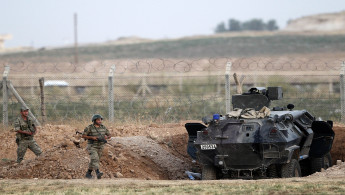Turkey 'preparing' for military intervention in Syria
Turkish media reported on Sunday that top Turkish officials have begun preparations for a possible military intervention into northern Syria to prevent possible Kurdish threat.
2 min read
Turkish President Recep Tayyip Erdogan has stepped up for a military operation into Syrian territory. Reports published in Turkish media claim that the Turkish General Staff is on the verge of a possible military intervention with some 18,000 soldiers ready to be deployed into Syria.
Erdogan is chairing a regular National Security Council meeting on Monday, days after he vowed to prevent the establishment of a Kurdish state in northern Syria following advances by Kurdish fighters battling Islamic State group militants.
A source told al-Araby al-Jadeed Monday that President Erdogan and Prime Minister Davutoglu were pushing for Turkish military intervention in Aleppo province, mainly in Jarablus, to stop Kurdish forces under the excuse of fighting IS.
The aim of such intervention, the source added, is to establish a buffer zone on the borders, set a no-fly zone to support the rebels, and stop the influx of Syrian refugees into Turkey. However, the plan faced heavy opposition from army commanders.
Turkish Buffer Zone
As Kurdish forces secure more territory on the border with Turkey against IS, Erdogan's interventionist plan are becoming more viable.
On Monday, Turkish media reported that after several meetings, the Turkish General Staff, National Intelligence Organization (MIT) and the Prime Ministry decided to establish a buffer zone in Syrian territory. The army and MIT will have completed the scheme of the maneuver by Friday, July 3.
According to pro-government Turkish news daily Yeni Safak, Ankara plans to establish a 110-km long and 28-km wide buffer zone stretching from Karkamis to Oncupinar. The Turkish Armed Forces are expected to conduct a synchronous operation on both sides.
Turkey will first attempt to secure diplomatic support of its NATO allies and US-led coalition forces. If this plan works, Turkish soldiers are expected to be stationed in the buffer zone for two years, the daily added.
If Turkey does not get diplomatic backing from its allies, then the "Southern Lebanon Model" will be considered as "plan B". Israel once used the model to secure itself in a region in southern Lebanon dominated by Hizballah fighters.
If "plan B" is applied, the Turkey daily adds, Turkish soldiers will stay for a shorter time in the zone but will train and equip the Free Syrian Army to ensure the security of the region.
Erdogan is chairing a regular National Security Council meeting on Monday, days after he vowed to prevent the establishment of a Kurdish state in northern Syria following advances by Kurdish fighters battling Islamic State group militants.
A source told al-Araby al-Jadeed Monday that President Erdogan and Prime Minister Davutoglu were pushing for Turkish military intervention in Aleppo province, mainly in Jarablus, to stop Kurdish forces under the excuse of fighting IS.
The aim of such intervention, the source added, is to establish a buffer zone on the borders, set a no-fly zone to support the rebels, and stop the influx of Syrian refugees into Turkey. However, the plan faced heavy opposition from army commanders.
Turkish Buffer Zone
As Kurdish forces secure more territory on the border with Turkey against IS, Erdogan's interventionist plan are becoming more viable.
On Monday, Turkish media reported that after several meetings, the Turkish General Staff, National Intelligence Organization (MIT) and the Prime Ministry decided to establish a buffer zone in Syrian territory. The army and MIT will have completed the scheme of the maneuver by Friday, July 3.
According to pro-government Turkish news daily Yeni Safak, Ankara plans to establish a 110-km long and 28-km wide buffer zone stretching from Karkamis to Oncupinar. The Turkish Armed Forces are expected to conduct a synchronous operation on both sides.
Turkey will first attempt to secure diplomatic support of its NATO allies and US-led coalition forces. If this plan works, Turkish soldiers are expected to be stationed in the buffer zone for two years, the daily added.
If Turkey does not get diplomatic backing from its allies, then the "Southern Lebanon Model" will be considered as "plan B". Israel once used the model to secure itself in a region in southern Lebanon dominated by Hizballah fighters.
If "plan B" is applied, the Turkey daily adds, Turkish soldiers will stay for a shorter time in the zone but will train and equip the Free Syrian Army to ensure the security of the region.





 Follow the Middle East's top stories in English at The New Arab on Google News
Follow the Middle East's top stories in English at The New Arab on Google News


